Cultivating Connections: The Power of Recommendation Follow-up Letters | 18 Templates Included
Welcome to our comprehensive guide on Recommendation Follow-up Letters! In today’s interconnected world, recommendations hold significant value, and following up on those recommendations is equally crucial. Whether you have recommended someone for a job, suggested a product or service, or endorsed a personal development resource, sending a thoughtful follow-up letter demonstrates your genuine interest and commitment. This guide aims to provide you with valuable insights, practical tips, and 18 ready-to-use templates to help you navigate the art of follow-up letters effectively. Discover the art of nurturing relationships, expressing gratitude, and offering ongoing support through the power of Recommendation Follow-up Letters.
Tips for Writing Effective Follow-up Letters
- Personalize the Letter: Address the recipient by their name and reference your previous interaction or recommendation. Personalization shows that you value the relationship and reinforces the connection.
- Express Gratitude: Begin the letter by expressing gratitude for their willingness to consider your recommendation or for their past actions. Show appreciation for their time and effort.
- Be Specific in Your Inquiries: Ask specific questions about their experience or progress related to the recommendation. This helps gather valuable feedback and shows genuine interest in their outcomes.
- Offer Actionable Suggestions: Provide actionable suggestions or recommendations based on the context of your initial recommendation. This could include additional resources, tips, or guidance to enhance their experience or further support their goals.
- Keep the Tone Positive and Supportive: Maintain a positive and supportive tone throughout the letter. Avoid sounding demanding or overly critical. Show that you are there to offer assistance and support.
- Keep the Letter Concise and Clear: Be clear and concise in your communication. Focus on the main points and keep the letter brief. Use clear and easy-to-understand language.
- Proofread and Edit: Before sending the follow-up letter, proofread it carefully to ensure there are no grammatical or spelling errors. Edit the content to make sure it flows smoothly and conveys your message effectively.
- Follow Professional Formatting: Use a professional letter format, including your contact information, a proper salutation, body paragraphs, and a closing with your signature. Maintain a professional tone and avoid using informal language.
- Include Relevant Contact Information: Provide your contact information in the letter so that the recipient can easily reach out to you if they have any questions or need further assistance.
- Follow-Up Timely: Send the follow-up letter within a reasonable timeframe after making the initial recommendation. This ensures that the recommendation is fresh in the recipient’s mind and shows your proactive approach.
#1: Job Recommendation Follow-up Letter:
After recommending someone for a job, follow up with a letter highlighting their qualifications and expressing your continued support. This job recommendation follow-up letter serves the purpose of expressing continued support for a candidate whom you have recommended for a job. It aims to provide additional information about the candidate’s qualifications and highlights their strengths and suitability for the position. The letter reinforces your endorsement of the candidate and aims to strengthen their chances of securing the job by reaffirming their qualifications and the value they can bring to the role.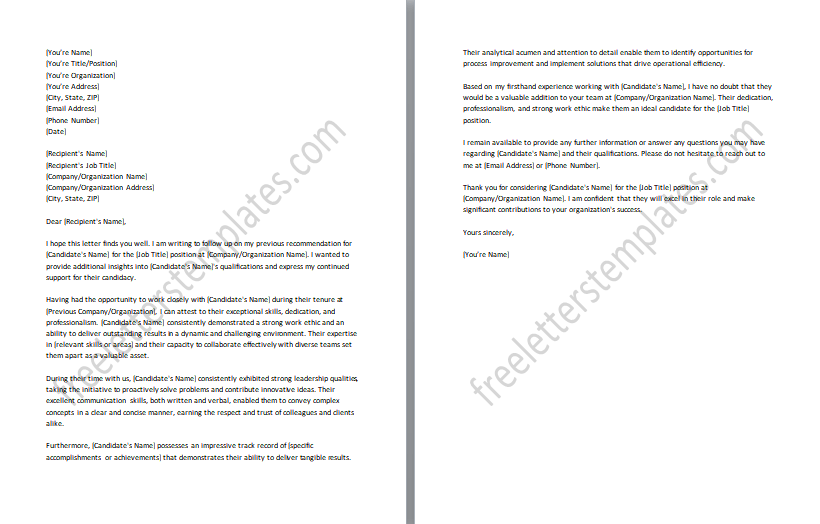
#2: College Recommendation Follow-up Letter:
If you’ve written a letter of recommendation for a student’s college application, follow up with a letter expressing your confidence in their abilities and wishing them well. The purpose of this letter is to reinforce your belief in the student’s abilities, reiterate the positive qualities and achievements highlighted in the initial recommendation, and convey your best wishes for their future endeavors. By sending this follow-up letter, you aim to provide additional support and encouragement to the student as they navigate the college admissions process and pursue their educational goals.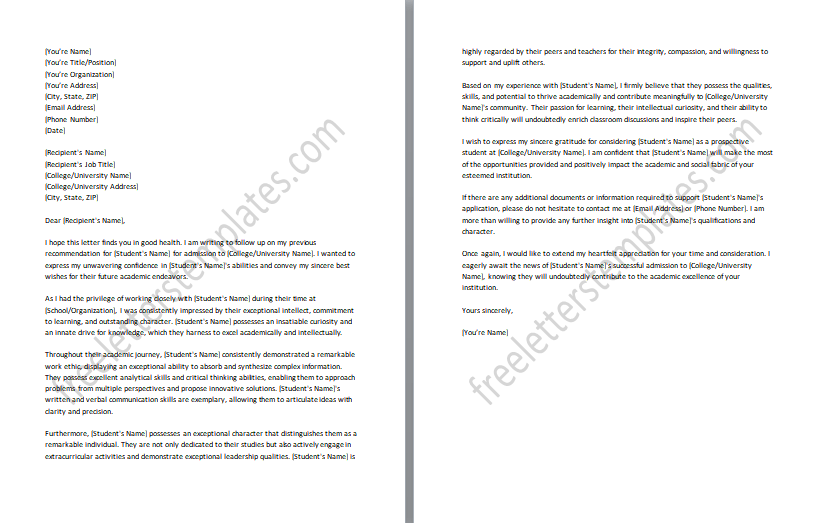
#3: Product Recommendation Follow-up Letter:
If you recommended a product or service to someone, follow up with a letter to inquire about their experience and offer further assistance if needed. This product recommendation follow-up letter is designed to follow up with someone to inquire about their experience with a recommended product or service. Additionally, the letter serves to offer further assistance or support if needed, such as addressing any concerns or providing additional information about the recommended product. By sending this follow-up letter, you aim to maintain a positive customer relationship, ensure customer satisfaction, and provide ongoing support to enhance their overall experience with the recommended product or service.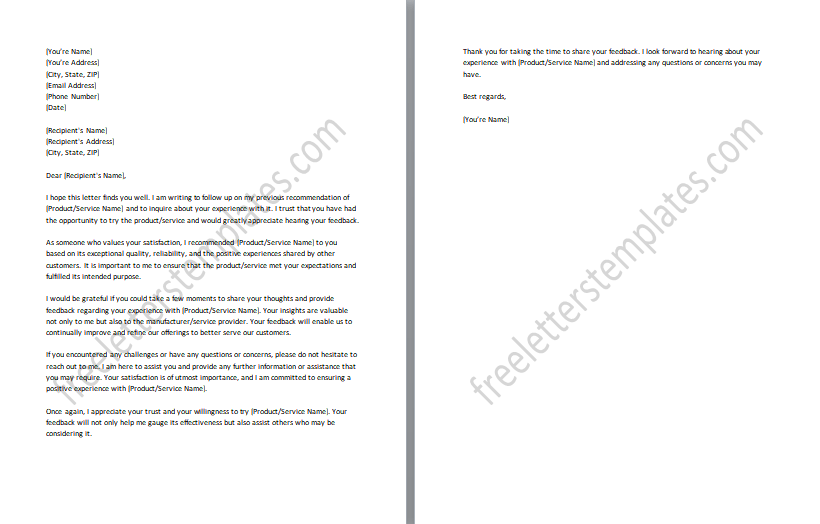
#4: Book Recommendation Follow-up Letter:
After recommending a book to a friend or colleague, follow up with a letter to discuss their thoughts on the book and share your insights. This book recommendation follow-up letter is meant to initiate a discussion with a friend or colleague about a book you have previously recommended to them. The purpose of this letter is to gather their thoughts and feedback on the book, encouraging an exchange of insights and perspectives. By sending this follow-up letter, you aim to foster a deeper connection through shared literary experiences, engage in meaningful conversations, and expand your mutual appreciation for literature.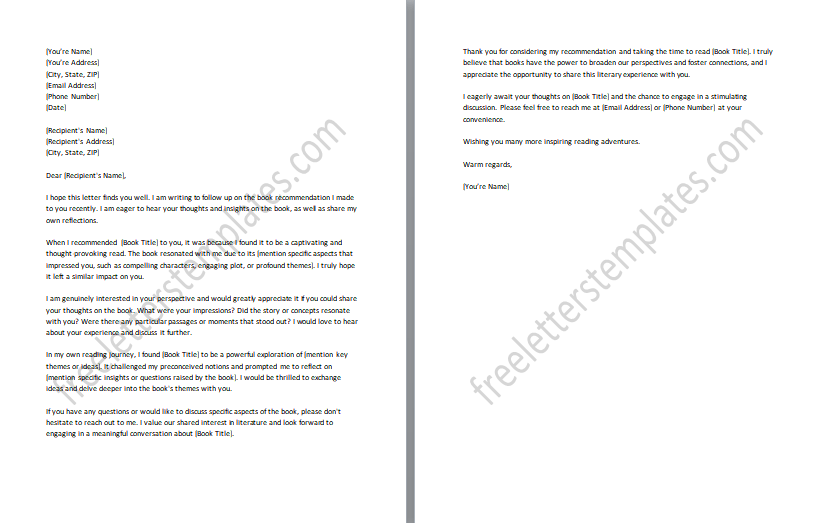
#5: Restaurant Recommendation Follow-up Letter:
If you recommended a restaurant to someone, follow up with a letter to inquire about their dining experience and recommend other dishes they might enjoy. This restaurant recommendation follow-up letter is designed to reach out to someone after recommending a specific restaurant and inquiring about their dining experience. The purpose of this letter is to gather feedback on their visit, including their overall satisfaction, the quality of the food and service, and any specific dishes they enjoyed. Additionally, the letter serves to offer further recommendations and suggestions for other dishes they might enjoy based on their preferences or the restaurant’s specialties.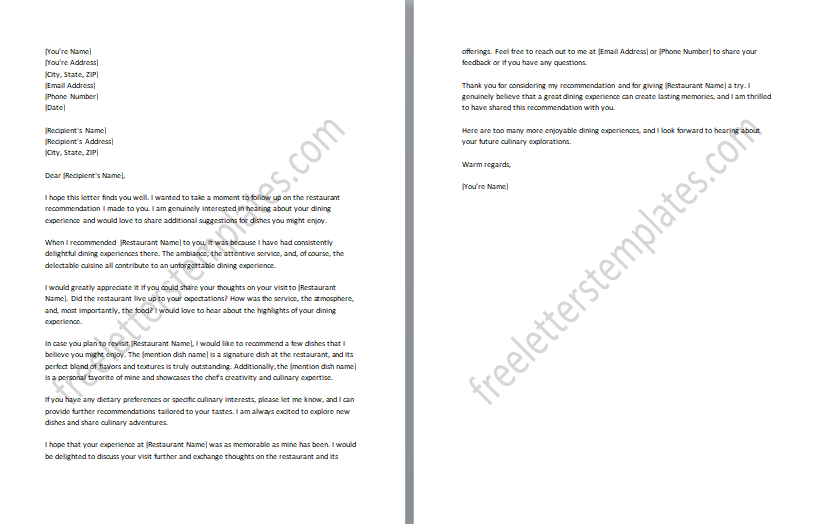
#6: Travel Recommendation Follow-up Letter:
After suggesting a travel destination or itinerary to someone, follow up with a letter to hear about their trip and provide any additional travel tips or recommendations. This travel recommendation follow-up letter is intended to reconnect with someone after suggesting a travel destination or itinerary and inquire about their trip experience. The primary purpose of this letter is to gather feedback and insights on their journey, including their overall impressions, highlights, and any challenges they may have encountered. Moreover, the letter provides an opportunity to offer additional travel tips, recommendations, or insights based on your own experiences or knowledge of the destination.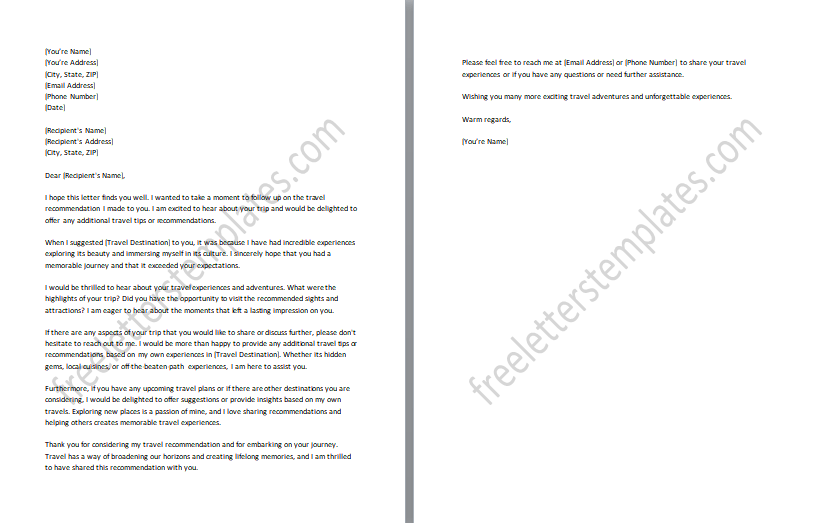
#7: Health and Wellness Recommendation Follow-up Letter:
If you recommended a health and wellness program, supplement, or practitioner to someone, follow up with a letter to check on their progress and offer ongoing support. This health and wellness recommendation follow-up letter is intended to follow up with someone after recommending a health and wellness program, supplement, or practitioner. The primary purpose of this letter is to check on their progress and well-being since receiving your recommendation. The letter aims to gather feedback on their experience, inquire about any challenges or successes they may have encountered, and offer ongoing support in their health and wellness journey.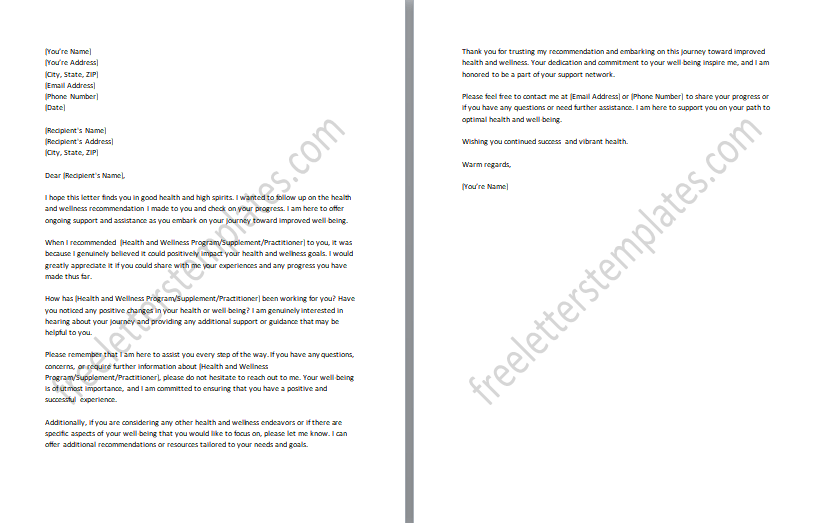
#8: Personal Development Recommendation Follow-up Letter:
After recommending a personal development resource such as a course or workshop, follow up with a letter to inquire about their progress and share additional resources. This personal development recommendation follow-up letter is intended to follow up with someone after recommending a personal development resource, such as a course or workshop. The purpose of this letter is to inquire about their progress and engagement with the recommended resource, as well as to offer ongoing support and share additional resources that may be beneficial to their growth journey.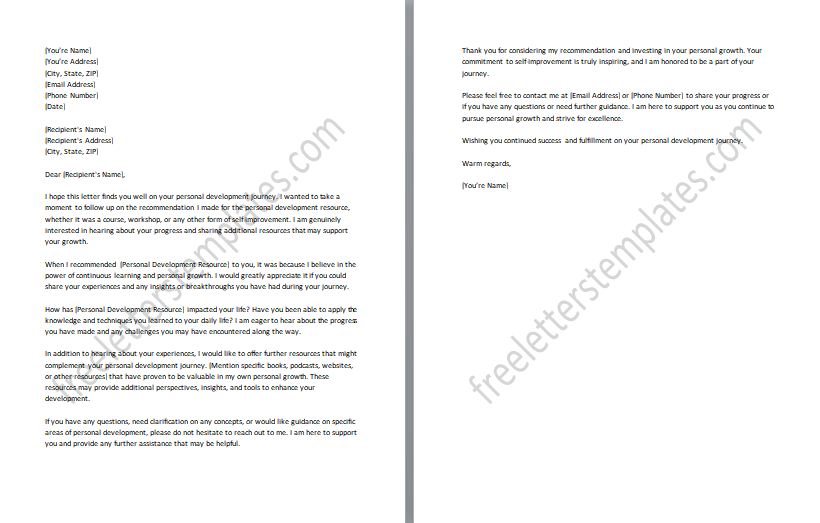
#9: Business Recommendation Follow-up Letter:
If you recommended a business strategy or solution, follow up with a letter to assess the implementation and offer any further guidance or suggestions. This business recommendation follow-up letter is intended to assess the implementation of a recommended business strategy or solution and offer further guidance or suggestions. Additionally, the letter serves to provide ongoing support and offer any additional guidance or suggestions that may enhance the implementation or address any challenges encountered. By sending this follow-up letter, you aim to demonstrate your commitment to their success, ensure their satisfaction with the recommendation, and provide valuable insights to optimize their business strategies and solutions.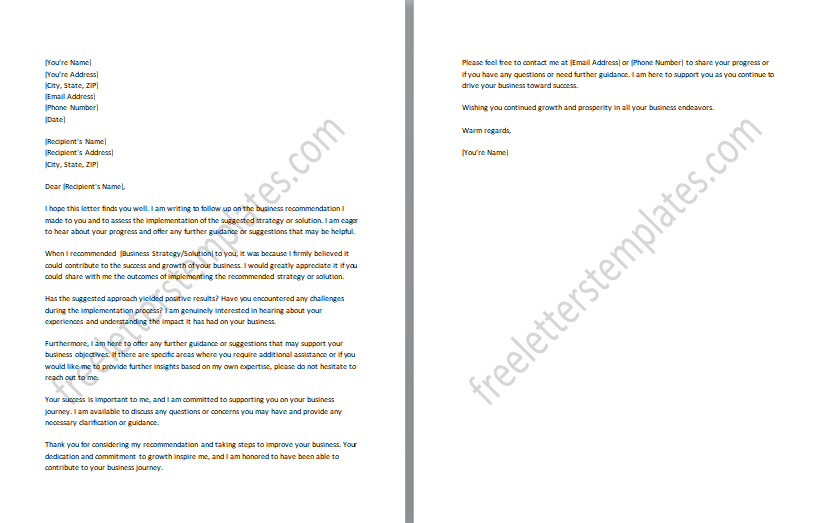
#10: Investment Recommendation Follow-up Letter:
After recommending an investment opportunity or strategy, follow up with a letter to review the progress and provide updates on the investment performance. This follow-up letter regarding the investment recommendation aims to provide an update on the progress and performance of the recommended investment opportunity or strategy. The main purpose of this letter is to review how the investment has been faring and share any relevant updates, considering the ever-changing market conditions. By sending this letter, we aim to maintain open and transparent communication, ensuring that you have the necessary information to navigate your investment journey successfully.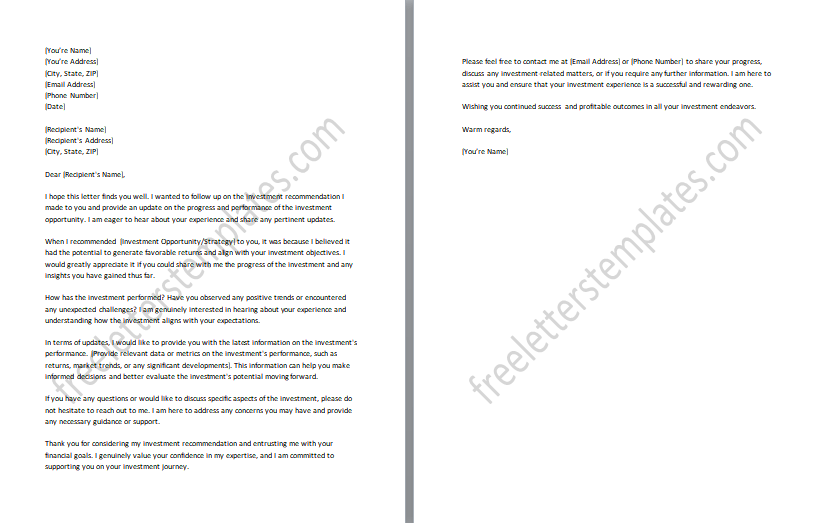
#11: Volunteer Recommendation Follow-up Letter:
If you recommended someone for a volunteer position, follow up with a letter to express your appreciation for their contributions and inquire about their experience. This volunteer recommendation follow-up letter is intended to express appreciation to someone whom you have recommended for a volunteer position. Additionally, the letter aims to inquire about their overall experience, including their satisfaction, challenges, and any feedback they may have. By sending this follow-up letter, you aim to show gratitude for their dedication, assess their volunteer experience, and ensure their ongoing engagement and satisfaction with their volunteering efforts.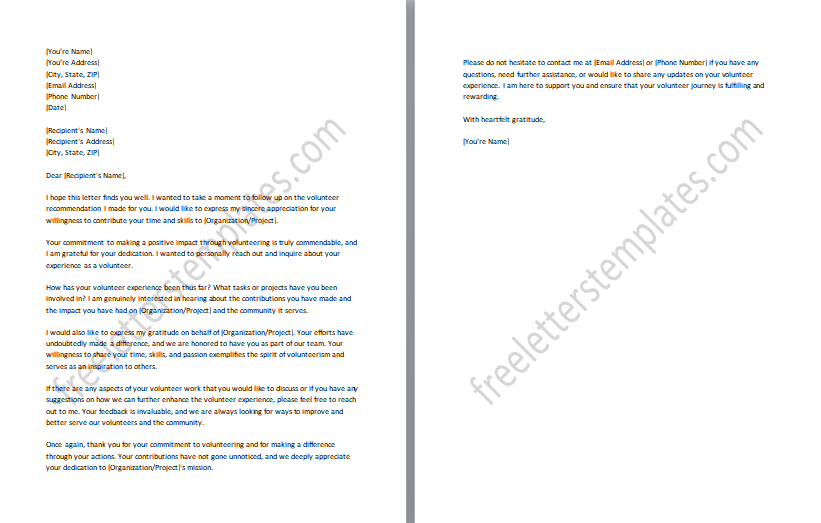
#12: Event Recommendation Follow-up Letter:
After recommending an event or conference to someone, follow up with a letter to gather feedback and suggestions for future events. This event recommendation follow-up letter is meant to gather feedback and suggestions from someone after you have recommended an event or conference to them. The primary purpose of this letter is to inquire about their experience attending the event and gather their insights and feedback regarding its organization, content, and overall satisfaction. Additionally, the letter aims to invite suggestions or recommendations for future events, helping to improve and tailor recommendations for similar occasions in the future.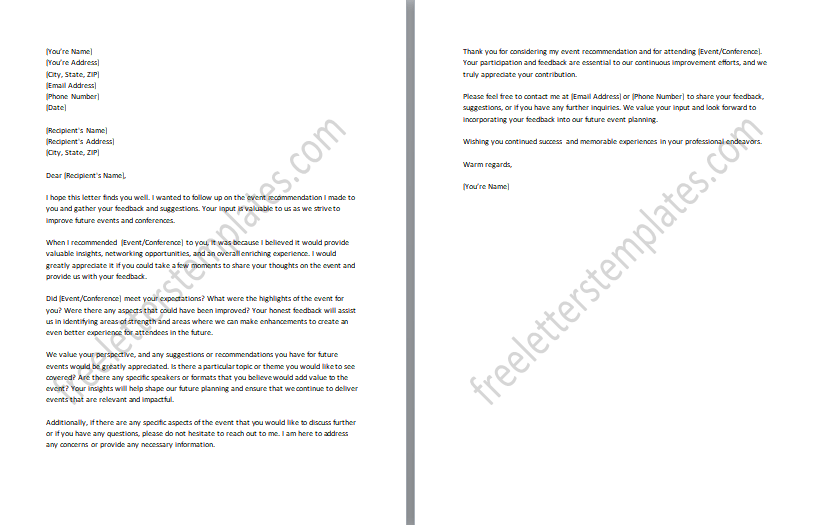
#13: Technology Recommendation Follow-up Letter:
If you recommended a technology solution or gadget to someone, follow up with a letter to inquire about their experience and offer troubleshooting tips if needed. This technology recommendation follow-up letter serves the purpose of checking in with someone after recommending a technology solution or gadget to them. The letter’s primary objective is to inquire about their experience with the recommended technology, including any challenges or successes they may have encountered. Furthermore, the letter aims to provide troubleshooting tips and assistance if the recipient is facing any issues or requires additional support.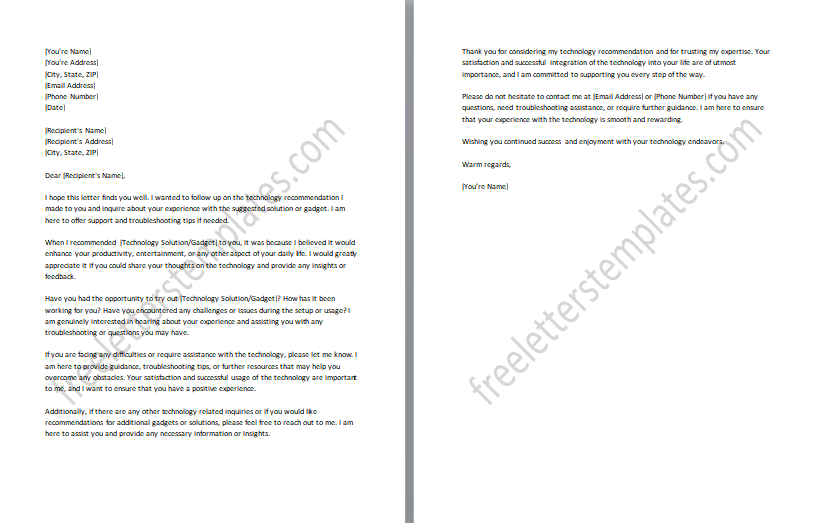
#14: Financial Recommendation Follow-up Letter:
After recommending financial products or services, follow up with a letter to discuss the outcomes and provide additional financial advice if required. This financial recommendation follow-up letter is intended to discuss the outcomes of the recommended financial products or services and provide additional financial advice if required. The main purpose of this letter is to review the effectiveness of the recommendations and evaluate the impact they have had on the recipient’s financial situation. Additionally, the letter aims to offer further guidance or insights based on their specific needs or changes in the financial landscape.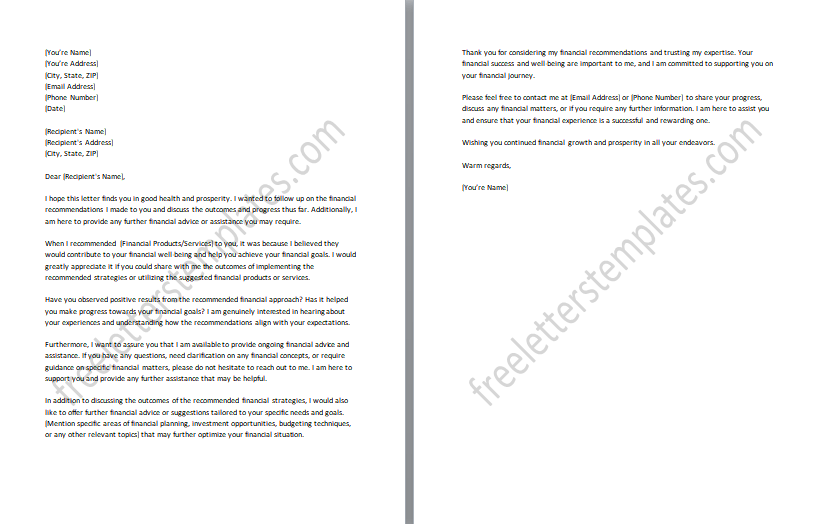
#15: Educational Recommendation Follow-up Letter:
If you recommended an educational institution or program, follow up with a letter to check on the progress of the person and offer any further guidance or resources. This educational recommendation follow-up letter is intended to check on the progress of someone you have recommended an educational institution or program to. The primary purpose of this letter is to inquire about their educational journey and gather updates on their experiences and achievements. Additionally, the letter aims to offer further guidance, resources, or support to enhance their educational endeavors.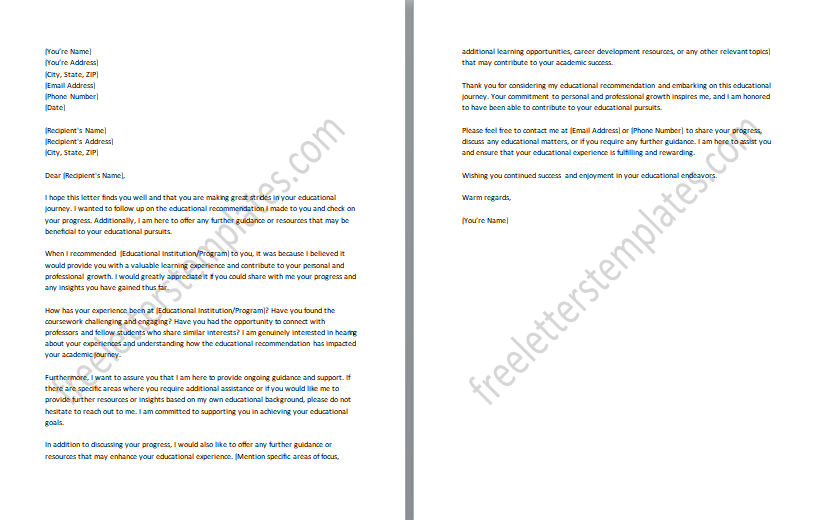
#16: Pet Recommendation Follow-up Letter:
After recommending a pet-related service or product, follow up with a letter to inquire about their experience and provide any additional tips for pet care. This pet recommendation follow-up letter is intended to reach out to someone after recommending a pet-related service or product and inquire about their experience. The primary purpose of this letter is to gather feedback on the recommended service or product, including their satisfaction, effectiveness, and any challenges they may have encountered. Additionally, the letter aims to provide any additional tips, advice, or resources for pet care based on your knowledge and experience.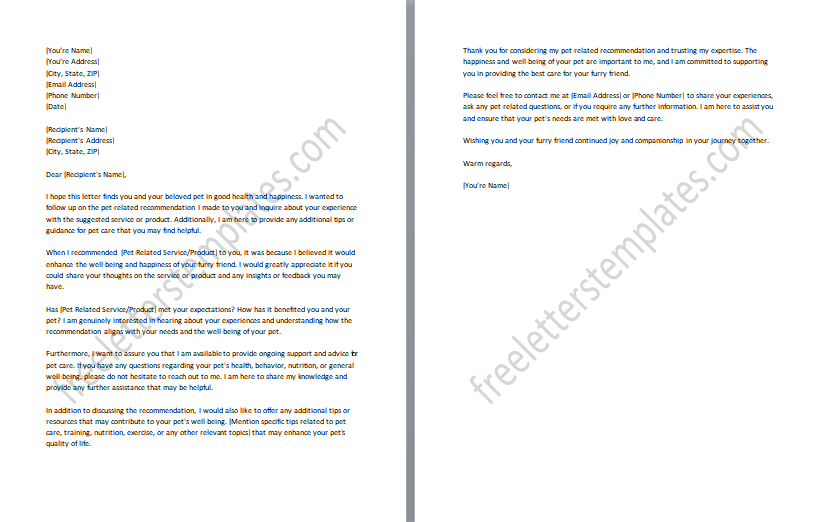
#17: Home Improvement Recommendation Follow-up Letter:
If you recommended a contractor or home improvement service, follow up with a letter to review the quality of their work and offer any suggestions for improvement. This home improvement recommendation follow-up letter is intended to review the quality of work performed by a recommended contractor or home improvement service and offer suggestions for improvement, if necessary. The main purpose of this letter is to assess the outcome of the recommended service, including the quality of workmanship, adherence to timelines, and overall satisfaction. By sending this follow-up letter, you aim to ensure the recipient’s satisfaction with the recommended contractor, maintain a high standard of service, and contribute to ongoing improvement in the home improvement industry.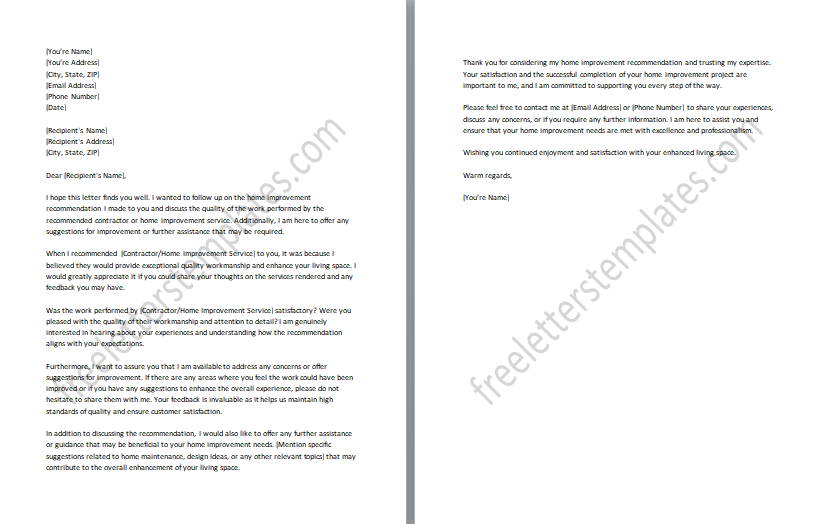
#18: Legal Recommendation Follow-up Letter:
After recommending a lawyer or legal service, follow up with a letter to inquire about the outcome of the case and offer any further assistance or recommendations. This legal recommendation follow-up letter is intended to inquire about the outcome of a case for which you recommended a lawyer or legal service. The primary purpose of this letter is to gather information regarding the progress and resolution of the case, including any favorable outcomes or challenges faced. Additionally, the letter aims to offer further assistance or recommendations if needed, such as connecting the recipient with additional legal resources or providing guidance for the next steps.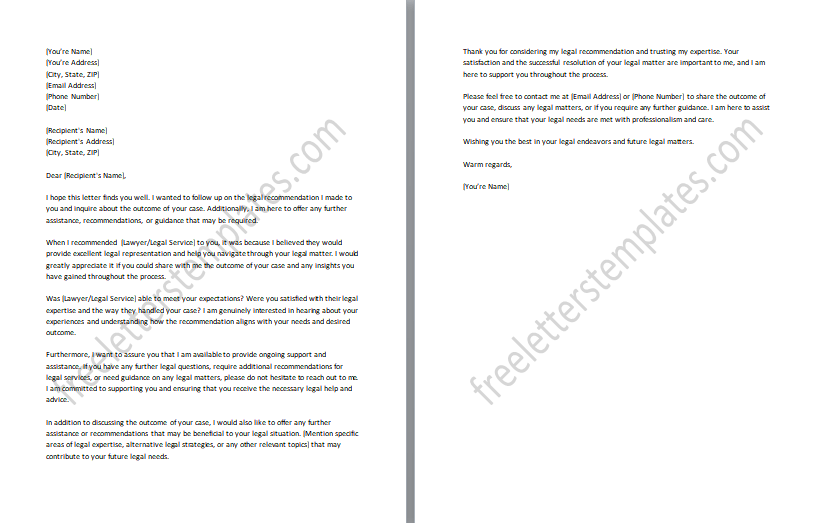
Customization and Personalization
- Address the Recipient: Begin by highlighting the importance of addressing the recipient by their name. Explain that using their name adds a personal touch and shows that the letter is specifically for them.
- Reference the Previous Interaction: Encourage the sender to reference the previous interaction or recommendation they made. Explain that this helps establish a connection and reminds the recipient of the context in which the recommendation was made.
- Tailor the Tone: Explain that the tone of the follow-up letter should be tailored to the nature of the recommendation and the relationship with the recipient. For example, a more formal tone may be appropriate for a professional recommendation, while a friendly and casual tone may be suitable for a personal recommendation.
- Customize the Content: Emphasize the need to customize the content of the follow-up letter based on the specific context and recipient. Encourage the sender to include specific details, experiences, or anecdotes that are relevant to the recommendation and the recipient’s situation.
- Show Genuine Interest: Stress the importance of showing genuine interest in the recipient’s experiences, progress, or outcomes related to the recommendation. Encourage the sender to ask personalized questions or make references that demonstrate their sincere interest in the recipient’s well-being or success.
- Use Their Language and Style: Explain that customizing the style of the follow-up letter to match the recipient’s preferences can create a more personal connection. Encourage the sender to pay attention to the recipient’s communication style and use language and expressions that resonate with them.
- Reflect Your Relationship: Highlight the significance of reflecting on the existing relationship with the recipient in the follow-up letter. Whether it’s a professional relationship or a personal one, tailor the content and tone to reflect the dynamics and history shared between the sender and recipient.
- Be Respectful and Considerate: Remind the sender to be respectful and considerate of the recipient’s preferences, values, and cultural background when customizing the follow-up letter. This helps ensure that the letter is well-received and fosters a positive impression.
Keep the Letter Concise and Clear
- Emphasize the Main Points: Explain that follow-up letters should focus on the main points or objectives. Encourage the sender to identify the key messages they want to convey and structure the letter around them.
- Use Clear and Easy-to-Understand Language: Emphasize the importance of using clear and simple language in the follow-up letter. Encourage the sender to avoid jargon, technical terms, or overly complex sentences that could confuse the recipient.
- Get to the Point: Advise the sender to get to the point quickly and avoid lengthy introductions or unnecessary details. Explain that the recipient may appreciate a direct and concise communication style that saves their time and makes it easier for them to grasp the main information.
- Organize Information Effectively: Guide the sender to organize the information in a logical and structured manner. Encourage the use of paragraphs, headings, or bullet points to make the letter easy to scan and navigate.
- Be Mindful of Length: Explain that follow-up letters should be kept brief and focused. Encourage the sender to be mindful of the recipient’s time and attention span. If the letter becomes too long, suggest splitting it into separate sections or considering alternative communication methods, such as scheduling a meeting or a phone call.
- Edit and Review: Advise the sender to review and edit the letter carefully to eliminate any unnecessary or repetitive information. Suggest reading the letter from the recipient’s perspective to ensure clarity and conciseness.
- Use Supporting Materials: If additional information or documentation is necessary, suggest attaching them as separate documents instead of including them in the body of the letter. This helps keep the main letter concise while providing the recipient with access to relevant details if needed.
Conclusion:
In conclusion, recommendation follow-up letters play a crucial role in maintaining strong connections, fostering gratitude, and providing ongoing support. By sending these letters, we demonstrate our commitment to the individuals we have recommended and show genuine interest in their experiences and outcomes. Through personalization, clear communication, and concise messaging, we can make these follow-up letters effective tools for expressing appreciation, gathering feedback, and offering further assistance. Whether it’s in professional, personal, or academic contexts, the power of a well-crafted follow-up letter should not be underestimated. So, take the time to follow up on your recommendations and make a lasting impact through thoughtful and considerate correspondence. Your follow-up letters can truly make a difference in strengthening relationships, promoting growth, and nurturing mutual success.